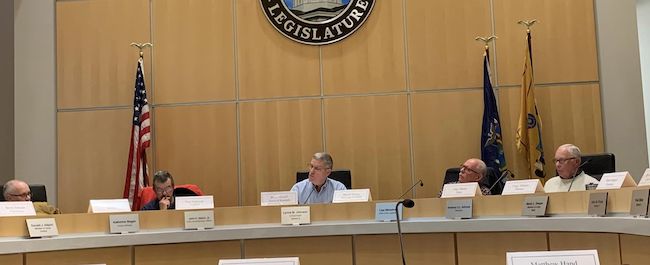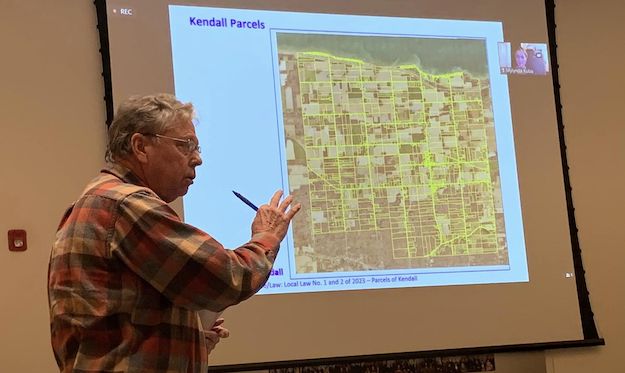Kendall’s proposed law regulating short-term rentals by waterfront voted down by county
Town Board in Kendall seeks $1,000 annual licensing fee for rentals

Photos by Tom Rivers: Bruce Newell (center) leads the discussion on Thursday about a proposed law in Kendall for regulating short-term rental such as Airbnbs. Newell is also a member of the Orleans County Planning Board, which met in the Orleans County Legislature’s chambers on Thursday. Also pictured include from left Kirk Myhill of Shelby, Paul Schwenk of Carlton, Dan Strong of Carlton (at-large central) and Gary Daum of Yates.
KENDALL – The Orleans County Planning Board last week recommended against a proposed law from Kendall that would regulate short-term rentals, such as Airbnb and Vrbo, in the waterfront district.
Kendall has about 8 or 10 of those sites in the waterfront district, just north of the Lake Ontario State Parkway.
Many neighbors have complained to town officials that the sites in residential neighborhoods are too loud at night, and people staying in the rentals often trespass and don’t take care of their garbage.
“Kendall recognizes these places can operate well,” said Bruce Newell, Kendall’s Planning Board chairman and a member of the County Planning Board. “We’re trying to put a mechanism in place for the problems.”
Kendall wants to ban any new short-term rentals in the Waterfront Residential and Waterfront Development districts. The current short-term rentals could continue but would have to pay an annual $1,000 annual licensing fee with the town, and carry a $3 million liability insurance, stipulations that David Bentley, owner of a short-term rental, said was excessive.
“We aren’t afraid of regulations,” Bentley said during last Thursday’s meeting. “But let’s be reasonable. These are way out of whack.”
There will be a public hearing in Kendall on Jan. 10 about the law. Kendall Town Board would need a super-majority vote of at least four out of five board members after the county voted it down.
Kendall’s proposed law would designate the code enforcement officer to do annual inspections of the sites. The code officer also would be asked to enforce the regulations, and could be called if a neighbor believed a party was out of hand, or if one of the short-term visitors was trespassing.
Some of the County Planning Board members thought that was too much to ask of a code officer. Newell said the town has reached out to the Sheriff’s Office about assistance in enforcing the law.
“We’re very sensitive about the demands it puts on code enforcement,” he said.
Mylynda Kuba, Murray code enforcement officer, said Kendall would need to provide decibel readers to the town code official and establish a standard on where to read them. Otherwise, a noise complaint could be considered subjective.
Newell said the licensing fee would give the town information on who is operating the short-term rentals. Town officials believe some of the sites are under the radar. They may not be reporting their “bed tax,” a 4 percent tax that goes to the county. The bed tax throughout the county last year generated about $80,000.
The $1,000 fee also would bring in some money directly to the town for the short-term rentals because the county currently keeps all of the bed tax.

Ken DeRoller, a former Orleans County legislator from Kendall, urged Kendall officials to work with Carlton and Yates for consistent regulations for short-term rentals among the three lakeshore towns. Carlton and Yates don’t have any regulations for the rentals right now.
Bruce Kirby, a County Planning Board member from Gaines, operates a short-term rental that he said generates about $6,000 in profit a year. He thought a $1,000 fee was too steep.
Kirby said he thought Kendall was trying to do too much with the proposed law.
Dan Strong, a member of the County Planning Board, said the law was “a good starting point” that gets all of the short-term rentals “playing by the same rules.”
Kendall isn’t cracking down on short-term rentals outside the waterfront districts because Newell said those locations are more spread out, and the town hasn’t received complaints from neighbors there.
In the waterfronts districts, the houses are much closer together, he said.
The town’s proposed law would be the first attempt in Orleans County to regulate Airbnbs or other short-term rentals, which became much more popular during the Covid pandemic, with many people from cities seeking a brief escape to a more open rural area.
Some of the highlights of the proposed law in Kendall include:
- Kendall will continue to allow the pre-existing short-term rentals, but will prohibit them at a location if they are discontinued for six months.
- Can operate as legal non-conforming uses.
- Transient occupancy considered when living or sleeping accommodation provided for compensation for less than 30 continuous calendar days
- No new transient or short-term rentals allowed in the waterfront districts, excluding bed and breakfasts which require a separate special use permit.
- All applications for a short-term rental license need to include site plans for the property with parking spaces, property lines, driveways and outdoor gathering areas, such as patios and decks.
- The town also wants to see floor plans containing the areas for transient space, a list of the owner(s) of the property as well as the manager with contact information, the number of permanent residents at the site (if any), the number of available parking spaces for transient use, a copy of the house rules provided to transients, and a list of neighbors within 150 feet of the property.
- The short-term rental owner needs to pay $1,000 to apply for the license and then $1,000 for each annual renewal.
- The town can enact penalties for violations that could include improper property maintenance – exposed garbage or litter on premises, failure to return trash containers to their storage location on the day of pickup, failure to maintain property or grounds in a neat and orderly fashion, parking vehicles in undesignated spots such as the lawn, parties that exceed the number of people authorized to be there in the license, failure to adhere to quiet hour restrictions between 10 p.m. and 8 a.m., occurrence of excessive noise or nuisances at any other time, and occurrences of transients trespassing on other properties.
- If the STR commits two or more offenses, the code officer can recommend to the Town Board that the license be revoked and a hearing can be held to consider the revocation.
Standards
- A maximum of two people per sleeping or no more than 8 people total in the STR.
- no recreational vehicles, campers, trailers or motor vehicles larger than a one-ton pickup truck, other than trailers for boats or jet skis to be launched at nearby ramps.
- No rental shall be above the second floor unless there is a sprinkler system.
- The locations used as rentals shall not have exterior signage indicating they are a rental. The short-term rentals “shall from all exterior indications be indistinguishable from any conventional dwelling.”
- The rental shall be limited to registered guests, and no commercial activities, public or private parties, receptions, meetings or similar social gatherings will be permitted. The site shall maintain a register of all transients staying there, including their permanent addresses and dates of their stay. That register shall be made available to the code enforcement officer or Sheriff’s Office if there are complaints about the transients’ behavior.
- Owners of the rentals shall reside within 30 minutes of the sites so they can quickly respond if there is a complaint. If an owner can’t respond within 30 minutes of a complaint, the owner needs to appoint a manager who can be onsite to answer a complaint within 30 minutes.
- Owners of the rentals need to provide proof to the town of general liability insurance of at least $3 million with respect to personal injury or death, and at least $300,000 with respect to property damage.
- The owner needs to provide proof to the town that the septic system is in good working order and has been pumped in the last three years (for sites not on a central sewer system.)
- Any violations can result in maximum fines of $3,000, with each continued violation a separate and additional offense.































































